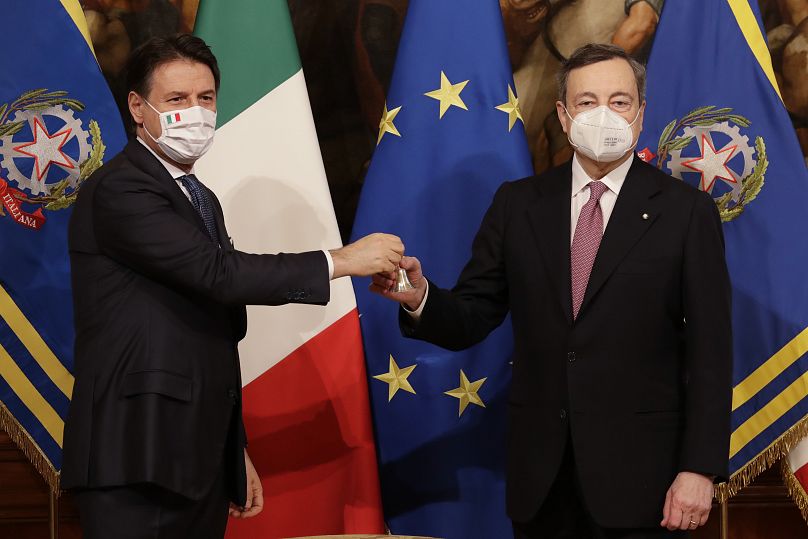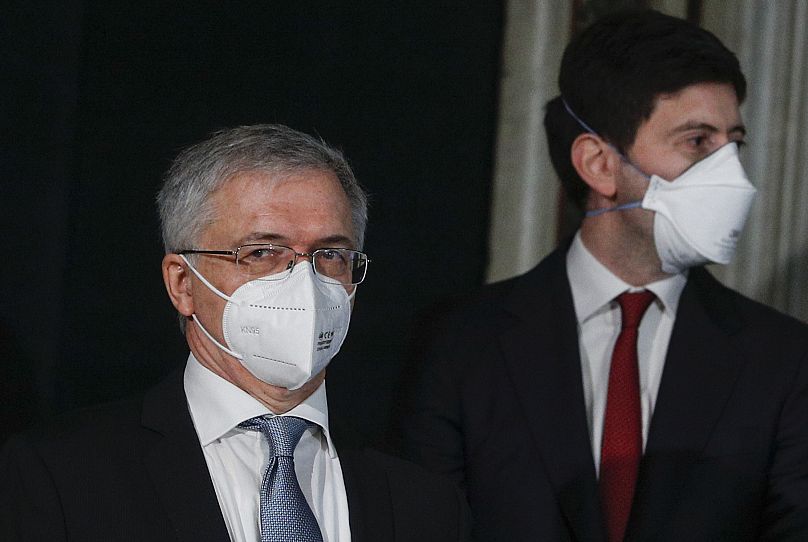Mario Draghi, the former ECB chief credited with saving the euro, is now faced with rescuing Italy from COVID-19 and its economic impact.
Italy has a new prime minister. This time, the revolving door of Italy's political arena has drafted in Mario Draghi, the former chief of the European Central Bank known for his "whatever it takes" approach in his days credited with saving the euro.
He isn't the first technocrat to lead Italy from disaster, either.
Mario Monti, an economist and former European Commissioner, was another "Super Mario" brought in in 2011 to combat the eurozone crisis.
"Then, as now, the perception was that politics was incapable of dealing with the situation," said Lisa Zanotti, an associate researcher at Diego Portales University.
Writing for the London School of Economics, she added that Italy's tendency to deflect power to technocrats when things go south might not be particularly positive for democracy in the long term.
But that's not the immediate issue for PM Draghi and his new government; rather, the current health and finance crises will come first.
More than 93,000 people have died in Italy as a result of the coronavirus pandemic, which has also worsened an already negative economic outlook.
The EU's third-largest economy, behind that of Germany and France, is now experiencing its worst downturn since the Second World War.
"Draghi's emphasis will be on firefighting," Dr Luigi Scazzieri, a research fellow at the Centre for European Reform (CER), told Euronews. "First is making sure that the vaccination campaign picks up speed. Second is ensuring that Italy's economy recovers quickly, by spending the money from the EU's recovery fund in ways that maximise potential growth."
The EU's vaccine roll-out has been infamously sluggish due to slower timeframes for securing contracts with pharmaceutical companies and for approving the jabs.
Compared to other member states, however, Italy has been faster than most — although it has prioritised healthcare workers, meaning many vulnerable citizens remain at-risk.
Meanwhile, decisions on how to spend €209bn of EU recovery funds might sound easy, especially when compared with Monti's reverse task as PM on how to raise austerity, but it does come with its challenges, ie: spending money is simple; it's the structural reform that comes with it that isn't.
In order to access the money, which is part of a €750bn EU coffer of grants and loans, member states must draw up plans by the end of April that align recovery with guidelines set by Brussels.
This includes, for instance, allocating at least 37% to the transition of a greener economy and 20% to initiatives to digitise economies. For Italy, this means cutting red tape - something it is well known for - as well as promoting more competition in the economy.
"Draghi has also talked of broader reforms to Italy's tax system, public administration and justice system," said Scazzieri. "But these reforms will be difficult as they will require a lot of time and political capital. And it will be difficult to get his disparate coalition to agree on a common stance."
He added: "Draghi's problems will be worse if the pandemic does not ease by this summer and lockdowns also prove necessary later this year."
How did Italy get here?
Italy's former coalition, led by Giuseppe Conte, was thrown into turmoil in mid-January after Matteo Renzi, another former PM and leader of the Italia Viva party, decided to withdraw from the government. This left Conte without a majority.
Why? Because Renzi did not agree with Conte's plan for spending the recovery cash. He wanted greater input into the plan, among other things, including calling for Conte to give up control of the security services.
Conte later resigned.
"In a parliamentary republic such as Italy, the resignation of the prime minister triggers a decision point for the president of the republic," said Giovanna De Maio, a non-resident fellow at the **Brookings Institution. "**President Sergio Mattarella could either call for the existing government to face a confidence vote in parliament or conduct consultations with all political parties to explore opportunities to create an alternative governing coalition.
"He chose the latter, and in this case tasked President of the Chamber Roberto Fico with exploring options. If consultations fail — which they did — the president of the republic can make one of two calls: dissolve parliament and call for new elections, or task an institutional figure (usually one who is outside politics), to form a new government that must face a confidence vote in the existing parliament.
"For this, Mattarella nominated former ECB Governor Mario Draghi."
De Maio then noted that the Italian president had argued that while elections are crucial, the technical and time constraints during a pandemic outweighed anything else.
"Elections require at least two months of preparation time, during which the campaign and elections themselves would imply sanitary risks," she said.
"Moreover, the lack of a fully empowered executive government could delay vaccinations and the elaboration of the economic plan requested by the EU commission before Italy can access funding from the EU Recovery Facility."
So how will a Draghi government be different?
"Draghi's priorities are the same as those that another government would have had," Scazzieri said. "The key difference is that he is not a politician and is interested above all in delivering results rather than staying in power.
"When deciding how to spend the recovery fund, his priority will be on maximising impact not being re-elected. And his authority means he has substantial momentum in his first few months at least."
He certainly has authority: considering his international legacy with the eurozone, his 71% approval rating, and his name drop rallying stock market indexes, Draghi is a popular choice.
The 73-year-old also commands a large majority in parliament; his broad coalition is built with politicians from nearly all Italian parties, along with a couple of fellow technocrats added in. This includes the likes of Bank of Italy director general Daniele Franco and physicist Roberto Cingolani.
What about his influence in the EU?
"A high-profile figure like Mario Draghi — who has top-level experience in European institutions — may take potentially stronger stances in international and European arenas," said De Maio. "Under his leadership, Italy may acquire more political leverage in the EU, challenging the Franco-German leadership in Europe and in its relations with the United States."
Teresa Coratella, from the European Council for Foreign Relations, added that both German Chancellor Angela Merkel and French President Emmanuel Macron have other things on their minds, too.
The former is soon to be stepping down from her role, while the latter will be facing re-election next year.
"The role that Draghi can play in this very delicate momentum of Europe is very important," she said.
For Scazzieri, the sentiment was similar, also saying that Draghi would likely try to "steer EU rules away from a premature return to austerity" and could "steer the EU towards a recovery fund 2.0 if this proves necessary".
"But Draghi won't be able to work miracles," he added. "Other leaders will respect him and listen to him, but they will continue to be subject to their domestic political constraints and incentives and will also know that Draghi might not be Italian prime minister for long."
Every weekday at 1900 CET, Uncovering Europe brings you a European story that goes beyond the headlines. Download the Euronews app to get an alert for this and other breaking news. It's available on Apple and Android devices.














